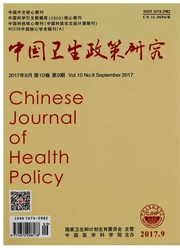

 中文摘要:
中文摘要:
目的:分析利益相关者的利益诉求对农村县乡两级医疗服务纵向整合的影响机制。方法:通过对黔江、黄陂、扬中三地区的利益相关者访谈资料进行词频分析,确定各地区利益相关者的利益诉求;通过利益诉求调查问卷了解各地区利益相关者对各类诉求的重视程度和利益得失情况;借鉴综合评价和博弈论的理论方法分析各地区利益相关者的诉求得益情况对其行为反应的影响。结果:各地区的整合政策均在不同程度上反映了利益相关者的利益诉求;利益诉求效益评分越高的地区,其利益相关者对整合政策的行为配合意愿越强。结论:农村医疗服务整合的改革政策应综合考虑各利益相关者的利益诉求;利益相关者的利益诉求满足情况越好,其配合整合改革的动力越强,从而可在一定程度上影响当地整合改革的实施效果。
 英文摘要:
英文摘要:
Objective: To analyze the mechanism on integration of health care services at the county and town- ship level from the perspective of stakeholder theory. Methods: The stakeholder interest demand was determined by word frequency analysis of interview data from stakeholders in the three regions of Qianjiang, Huangpi, and Zhen- jiang; the degree of attention and gains and losses of stakeholders towards various demands was investigated from the three regions through interest demand questionnaires ; the impact of demand benefits on behavioral responses has been evaluated through comprehensive evaluation theory and game theory. Results: Regitmal integration policies reflect the interest demands of stakeholders in varying degrees; the higher were the scores of demand benefits in interest de- mands questionnaires, the stronger was the willingness of stakeholders to coordinate integration policies. Conclusion: The policies of integration of health care services in rural China should consider all stakeholder interest demands; the better the interest demands of the stakeholders are satisfied, the stronger their motivation for integration reform will be, which may affect the implementation effects of local integration reforms to some extent.
 同期刊论文项目
同期刊论文项目
 同项目期刊论文
同项目期刊论文
 期刊信息
期刊信息
